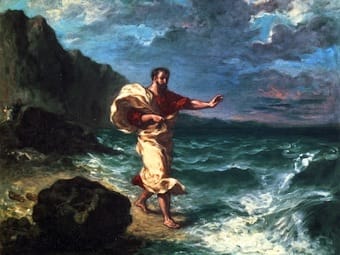‘Demosthenes Declaiming by the Seashore’, by Eugène Delacroix (1798-1863). As Plutarch tells us, Demosthenes adopted a range of unusual devices to improve his courtroom performance yet painstaking preparation remained the cornerstone of them. His rivals scoffed that he could not speak without notes, and in the Athenian senate he did defer to his colleague Demades rather than speak unprepared. But Plutarch says that he used notes only as an aide memoire, and in any case regarded diligent research as ‘a mark of respect for the people’; to rely not on rational persuasion but on a rhetorical battering suggested, said Demosthenes, government by the few, not the many.
FOR his bodily deficiencies he adopted the exercises which I shall describe, as Demetrius the Phalerian tells us, who says he heard about them from Demosthenes himself, now grown old. The indistinctness and lisping* in his speech he used to correct and drive away by taking pebbles in his mouth and then reciting speeches. His voice he used to exercise by discoursing while running or going up steep places, and by reciting speeches or verses at a single breath. Moreover, he had in his house a large looking-glass, and in front of this he used to stand and go through his exercises in declamation.
A story is told of a man coming to him and begging his services as advocate, and telling at great length how he had been assaulted and beaten by someone. “But certainly,” said Demosthenes, “you got none of the hurts which you describe.” Then the man raised his voice and shouted: “I, Demosthenes, no hurts?”
“Now, indeed,” said Demosthenes, “I hear the voice of one who is wronged and hurt.”
So important in winning credence did he consider the tone and action of the speaker.
Abridged
* “Strictly,” American translator Bernadotte Perrin (1847-1920) tells us, “an inability to pronounce the letter ‘r,’ giving instead the sound of ‘l’.”
Questions for Critics
1. What is the author aiming to achieve in writing this?
2. Note any words, devices or turns of phrase that strike you. How do they help the author communicate his ideas more effectively?
3. What impression does this passage make on you? How might you put that impression into words?
Based on The English Critic (1939) by NL Clay, drawing on The New Criticism: A Lecture Delivered at Columbia University, March 9, 1910, by J. E. Spingarn, Professor of Comparative Literature in Columbia University, USA.
Archive
Word Games
Spinners Find in Think and Speak
For each group of words, compose a sentence that uses all three. You can use any form of the word: for example, cat → cats, go → went, or quick → quickly, though neigh → neighbour is stretching it a bit.
This exercise uses words found in the accompanying passage.
1 Little. Neglect. Service.
2 Large. Study. You.
3 Adopt. Come. Two.
Variations: 1. include direct and indirect speech 2. include one or more of these words: although, because, despite, either/or, if, unless, until, when, whether, which, who 3. use negatives (not, isn’t, neither/nor, never, nobody etc.)
Verb and Noun Find in Think and Speak
Many words can serve as noun or verb depending on context: see if you can prove this with the examples below. Nouns go well with words such as the/a, or his/her; verbs go well after I/you/he etc..
This exercise uses words found in the accompanying passage.
1 Use. 2 Mouth. 3 Form. 4 Start. 5 Wish. 6 Point. 7 Voice. 8 Win. 9 Make.
Variations: 1.if possible, use your noun in the plural, e.g. cat → cats. 2.use your verb in a past form, e.g. go → went. 3.use your noun in a sentence with one of these words: any, enough, fewer, less, no, some.
Opposites Find in Think and Speak
Suggest words or phrases that seem opposite in meaning to each of the words below. We have suggested some possible answers; see if you can find any others.
This exercise uses words found in the accompanying passage.
Variations: 1.instead of opposites, suggest words of similar meaning (synonyms). 2.use a word and its opposite in the same sentence. 3.suggest any 5 opposites formed by adding in-.
High Tiles Find in Think and Speak
Make words (three letters or more) from the seven letters showing below, using any letter once only. Each letter carries a score. What is the highest-scoring word you can make?
Your Words ()
If you like what I’m doing here on Clay Lane, from time to time you could buy me a coffee.
Buy Me a Coffee is a crowdfunding website, used by over a million people. It is designed to help content creators like me make a living from their work. ‘Buy Me a Coffee’ prides itself on its security, and there is no need to register.
Related Posts
Plutarch tells us how Alexander the Great came to bond with Bucephalus, the mighty stallion that bore him to so many victories.
Picture: By Antoine-Jean Gros (1771-1735), via Wikimedia Commons. Licence: Public domain.. Source.
Posted March 16 2021
Gaius Caesar is disappointed with the quality of the entertainment on offer in Rome’s Circus Maximus.
Picture: By Gorgo, Wikimedia Commons. Licence: Public domain image.. Source.
Posted November 15 2018
Picture: © Marie-Lan Nguyen, Wikimedia Commons. Licence: CC BY-CA 2.5.. Source.
Posted November 8 2016






